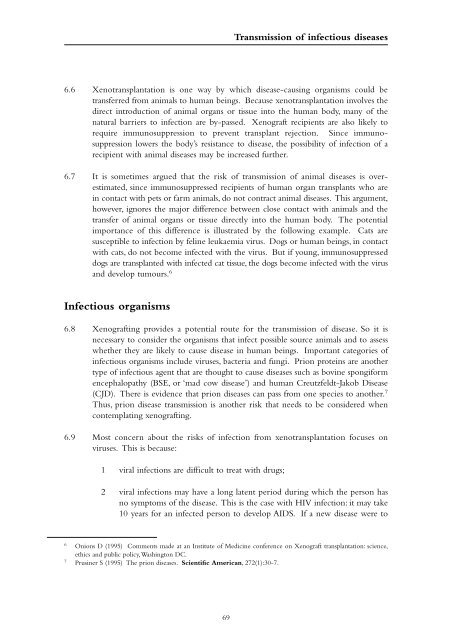Xenotransplantation - Nuffield Council on Bioethics
Xenotransplantation - Nuffield Council on Bioethics
Xenotransplantation - Nuffield Council on Bioethics
You also want an ePaper? Increase the reach of your titles
YUMPU automatically turns print PDFs into web optimized ePapers that Google loves.
Transmissi<strong>on</strong> of infectious diseases<br />
6.6 <str<strong>on</strong>g>Xenotransplantati<strong>on</strong></str<strong>on</strong>g> is <strong>on</strong>e way by which disease-causing organisms could be<br />
transferred from animals to human beings. Because xenotransplantati<strong>on</strong> involves the<br />
direct introducti<strong>on</strong> of animal organs or tissue into the human body, many of the<br />
natural barriers to infecti<strong>on</strong> are by-passed. Xenograft recipients are also likely to<br />
require immunosuppressi<strong>on</strong> to prevent transplant rejecti<strong>on</strong>. Since immunosuppressi<strong>on</strong><br />
lowers the body’s resistance to disease, the possibility of infecti<strong>on</strong> of a<br />
recipient with animal diseases may be increased further.<br />
6.7 It is sometimes argued that the risk of transmissi<strong>on</strong> of animal diseases is overestimated,<br />
since immunosuppressed recipients of human organ transplants who are<br />
in c<strong>on</strong>tact with pets or farm animals, do not c<strong>on</strong>tract animal diseases. This argument,<br />
however, ignores the major difference between close c<strong>on</strong>tact with animals and the<br />
transfer of animal organs or tissue directly into the human body. The potential<br />
importance of this difference is illustrated by the following example. Cats are<br />
susceptible to infecti<strong>on</strong> by feline leukaemia virus. Dogs or human beings, in c<strong>on</strong>tact<br />
with cats, do not become infected with the virus. But if young, immunosuppressed<br />
dogs are transplanted with infected cat tissue, the dogs become infected with the virus<br />
and develop tumours. 6<br />
Infectious organisms<br />
6.8 Xenografting provides a potential route for the transmissi<strong>on</strong> of disease. So it is<br />
necessary to c<strong>on</strong>sider the organisms that infect possible source animals and to assess<br />
whether they are likely to cause disease in human beings. Important categories of<br />
infectious organisms include viruses, bacteria and fungi. Pri<strong>on</strong> proteins are another<br />
type of infectious agent that are thought to cause diseases such as bovine sp<strong>on</strong>giform<br />
encephalopathy (BSE, or ‘mad cow disease’) and human Creutzfeldt-Jakob Disease<br />
(CJD). There is evidence that pri<strong>on</strong> diseases can pass from <strong>on</strong>e species to another. 7<br />
Thus, pri<strong>on</strong> disease transmissi<strong>on</strong> is another risk that needs to be c<strong>on</strong>sidered when<br />
c<strong>on</strong>templating xenografting.<br />
6.9 Most c<strong>on</strong>cern about the risks of infecti<strong>on</strong> from xenotransplantati<strong>on</strong> focuses <strong>on</strong><br />
viruses. This is because:<br />
1 viral infecti<strong>on</strong>s are difficult to treat with drugs;<br />
2 viral infecti<strong>on</strong>s may have a l<strong>on</strong>g latent period during which the pers<strong>on</strong> has<br />
no symptoms of the disease. This is the case with HIV infecti<strong>on</strong>: it may take<br />
10 years for an infected pers<strong>on</strong> to develop AIDS. If a new disease were to<br />
6<br />
Oni<strong>on</strong>s D (1995) Comments made at an Institute of Medicine c<strong>on</strong>ference <strong>on</strong> Xenograft transplantati<strong>on</strong>: science,<br />
ethics and public policy,Washingt<strong>on</strong> DC.<br />
7<br />
Prusiner S (1995) The pri<strong>on</strong> diseases. Scientific American, 272(1):30-7.<br />
69
















